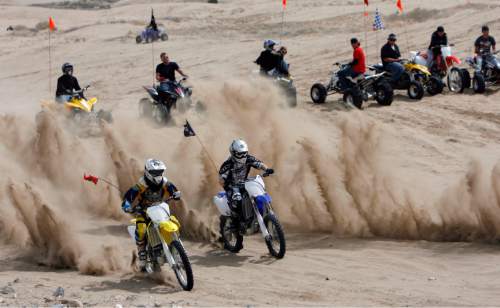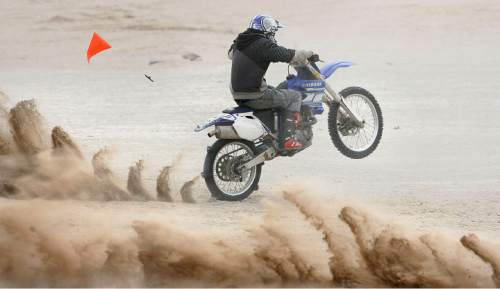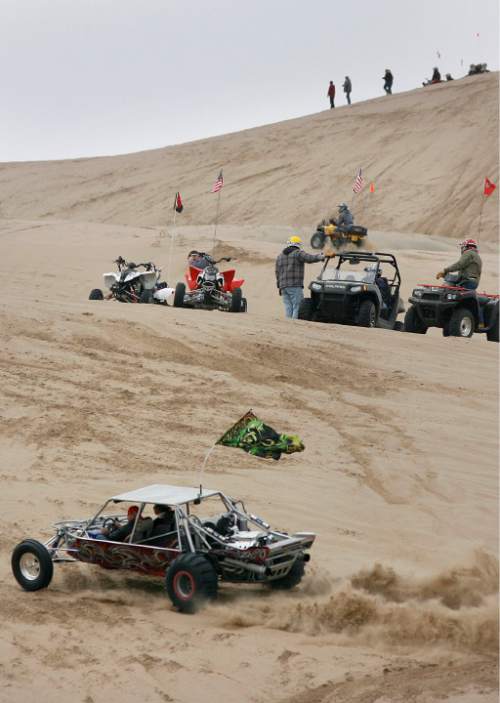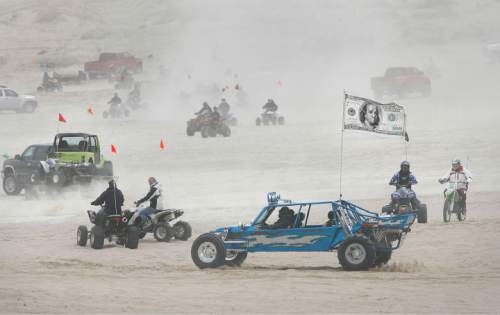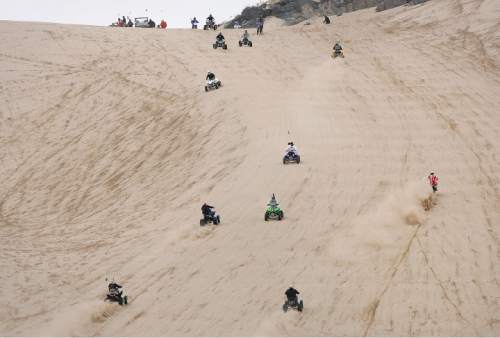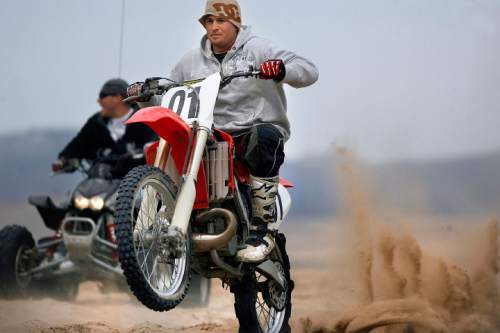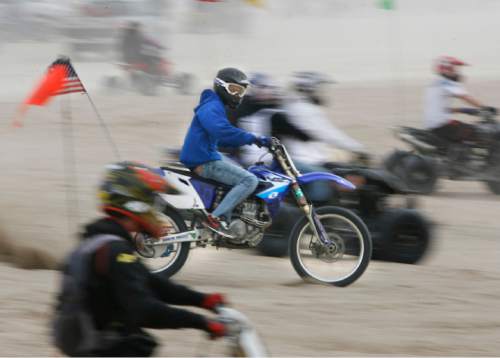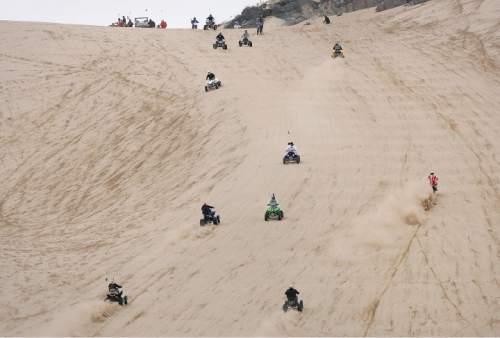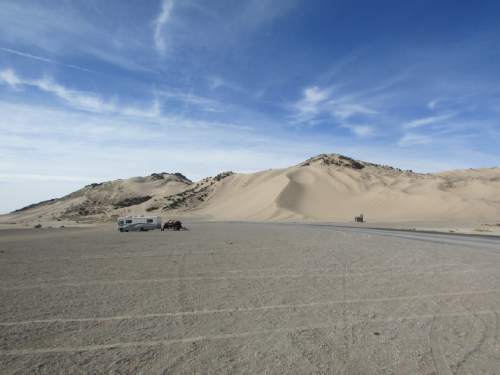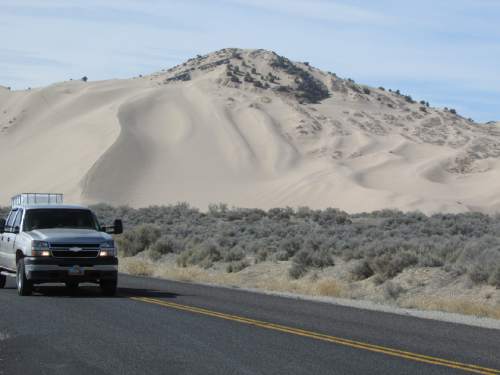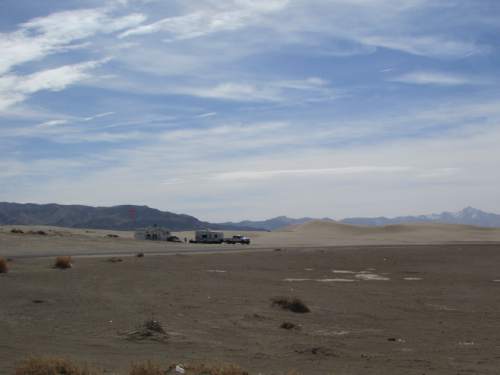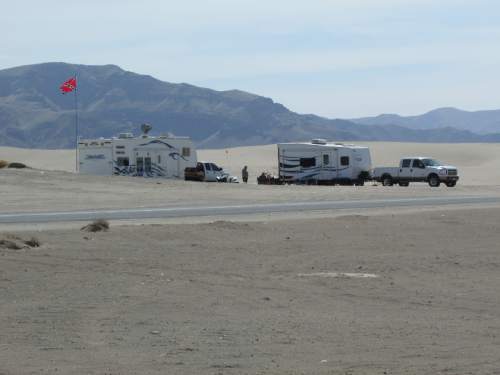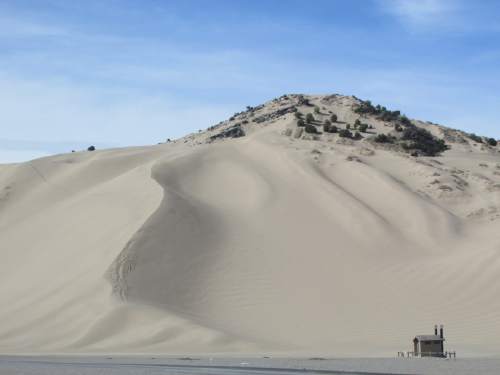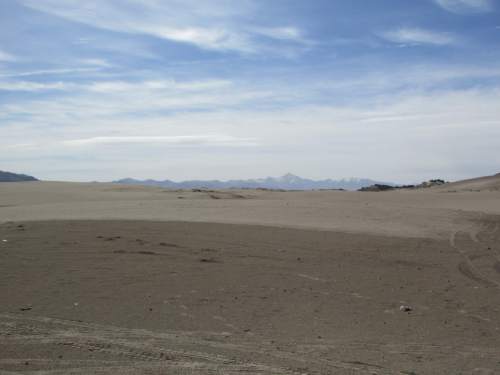Francisco Kjolseth | Tribune file photo
Conquering Sand Mountain, motor enthusiasts ride Utah's Little Sahara on April 10, 2009
Scott Sommerdorf | Salt Lake Tribune
LITTLE SAHARA
A rider's paddle tires churn up the sand as it prepares to power up "San
Scott Sommerdorf | Salt Lake Tribune
LITTLE SAHARA
Four- and two-wheel enthusiasts, dune buggies and more kick off the spring se
Scott Sommerdorf | Salt Lake Tribune
LITTLE SAHARA
A "sand rail" dune buggy with a $100 bill flag drives among other o
Scott Sommerdorf | Salt Lake Tribune
A variety of vehicles power up the "Sand Mountain" incline at Little Sahara Natio
Scott Sommerdorf | Salt Lake Tribune
LITTLE SAHARA
A rider churns up the sand as he begins to power up "Sand Mountain"
Scott Sommerdorf | Salt Lake Tribune
LITTLE SAHARA
A rider blurs past others waiting their turn to power up "Sand Mountain&
Scott Sommerdorf | Salt Lake Tribune
LITTLE SAHARA
A variety of vehicles power up the "Sand Mountain" incline at Littl
Tom Wharton | The Salt Lake Tribune
Sand Mountain, the major part of the Little Sahara Recreation Area west of Nephi, is a popu
Tom Wharton | The Salt Lake Tribune
Sand Mountain, the major part of the Little Sahara Recreation Area west of Nephi, is a popu
Scott Sommerdorf | Salt Lake Tribune
LITTLE SAHARA
A pair of atv riders with paddle tires wait for the impulse to race up "
Tom Wharton | The Salt Lake Tribune
Sand Mountain, the major part of the Little Sahara Recreation Area west of Nephi, is a popu
Tom Wharton | The Salt Lake Tribune
Sand Mountain, the major part of the Little Sahara Recreation Area west of Nephi, is a popu
Tom Wharton | The Salt Lake Tribune
Sand Mountain, the major part of the Little Sahara Recreation Area west of Nephi, is a popu
Tom Wharton | The Salt Lake Tribune
Sand Mountain, the major part of the Little Sahara Recreation Area west of Nephi, is a popu
Francisco Kjolseth | Tribune file photo
Conquering Sand Mountain, motor enthusiasts ride Utah's Little Sahara on April 10, 2009.
Scott Sommerdorf | Salt Lake Tribune
LITTLE SAHARA
A rider's paddle tires churn up the sand as it prepares to power up "Sand Mountain" at Little Sahara National Recreation Area. Utah lawmakers dedicated more money to their fight over federally-managed public lands, including Little Sahara.
Scott Sommerdorf | Salt Lake Tribune
LITTLE SAHARA
Four- and two-wheel enthusiasts, dune buggies and more kick off the spring season with motorized recreation and camping at Little Sahara sand dunes. In the 2015 legislative session, Utah lawmakers dedicated more money to their fight over federally-managed public lands, including Little Sahara.
Scott Sommerdorf | Salt Lake Tribune
LITTLE SAHARA
A "sand rail" dune buggy with a $100 bill flag drives among other off-road enthusiasts at Little Sahara National Recreation Area. In the 2015 legislative session, Utah lawmakers dedicated more money to their fight over federally-managed public lands, including Little Sahara.
Scott Sommerdorf | Salt Lake Tribune
A variety of vehicles power up the "Sand Mountain" incline at Little Sahara National Recreation Area. In the 2015 legislative session, Utah lawmakers dedicated more money to their fight over federally-managed public lands, including Little Sahara.
Scott Sommerdorf | Salt Lake Tribune
LITTLE SAHARA
A rider churns up the sand as he begins to power up "Sand Mountain" at Little Sahara National Recreation Area. In the 2015 legislative session, Utah lawmakers dedicated more money to their fight over federally-managed public lands, including Little Sahara.
Scott Sommerdorf | Salt Lake Tribune
LITTLE SAHARA
A rider blurs past others waiting their turn to power up "Sand Mountain" at Little Sahara National Recreation Area, Saturday 4/3/10. Four- and two-wheel enthusiasts, dune buggies and more kick off the spring season with motorized recreation and camping at Little Sahara sand dunes., Saturday 4/3/10.
Scott Sommerdorf | Salt Lake Tribune
LITTLE SAHARA
A variety of vehicles power up the "Sand Mountain" incline at Little Sahara National Recreation Area, Saturday 4/3/10. Four- and two-wheel enthusiasts, dune buggies and more kick off the spring season with motorized recreation and camping at Little Sahara sand dunes., Saturday 4/3/10.
Tom Wharton | The Salt Lake Tribune
Sand Mountain, the major part of the Little Sahara Recreation Area west of Nephi, is a popular Easter weekend destination for OHV enthusiasts.
Tom Wharton | The Salt Lake Tribune
Sand Mountain, the major part of the Little Sahara Recreation Area west of Nephi, is a popular Easter weekend destination for OHV enthusiasts.
Scott Sommerdorf | Salt Lake Tribune
LITTLE SAHARA
A pair of atv riders with paddle tires wait for the impulse to race up "Sand Mountain" at Little Sahara National Recreation Area, Saturday 4/3/10. Four- and two-wheel enthusiasts, dune buggies and more kick off the spring season with motorized recreation and camping at Little Sahara sand dunes.
Tom Wharton | The Salt Lake Tribune
Sand Mountain, the major part of the Little Sahara Recreation Area west of Nephi, is a popular Easter weekend destination for OHV enthusiasts.
Tom Wharton | The Salt Lake Tribune
Sand Mountain, the major part of the Little Sahara Recreation Area west of Nephi, is a popular Easter weekend destination for OHV enthusiasts.
Tom Wharton | The Salt Lake Tribune
Sand Mountain, the major part of the Little Sahara Recreation Area west of Nephi, is a popular Easter weekend destination for OHV enthusiasts.
Tom Wharton | The Salt Lake Tribune
Sand Mountain, the major part of the Little Sahara Recreation Area west of Nephi, is a popular Easter weekend destination for OHV enthusiasts.


